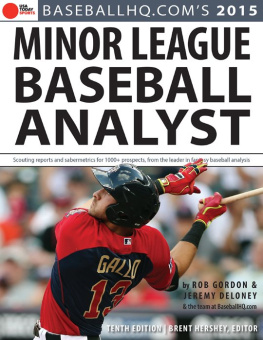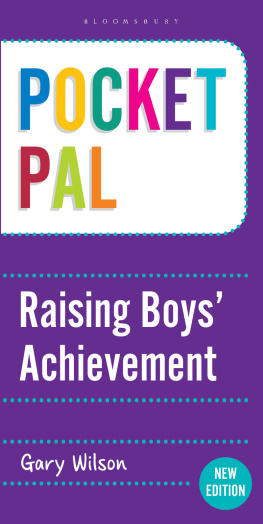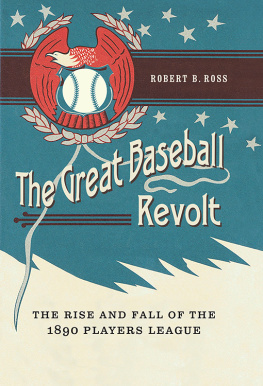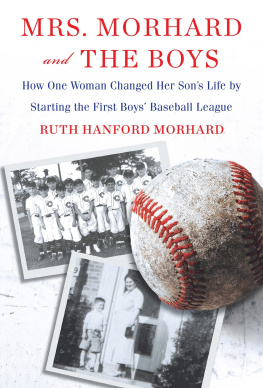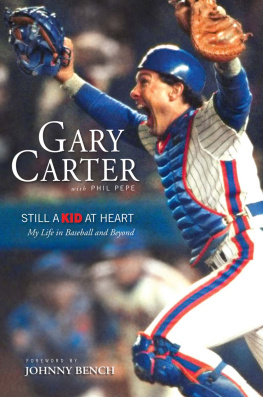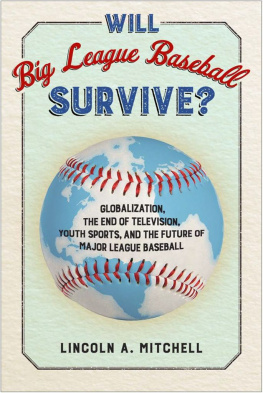The University of Chicago Press, Chicago 60637
The University of Chicago Press, Ltd., London
1987 by The University of Chicago
All rights reserved. Published 1987
Printed in the United States of America
96 5
ISBN 978-0-226-22354-4 (e-book)
Library of Congress Cataloging-in-Publication Data
Fine, Gary Alan.
With the boys.
Bibliography: p.
Includes index.
1. Little league baseball. 2. Baseball for childrenSocial aspects.United States. I. Title.
GV880.5.F56 1987 796.357'62 86-16056
ISBN 0-226-24937-9 (pbk.)
Preface
For three years I shared springs and summers with remarkable people: some of Americas preadolescents. Their remarkableness derives, not from the fact that they are unusually insightful or articulate for their age, but from the fact that they are not. Like every group of childrenall of us at one timethey constructed a social community and a common culture. This culture survived and flourished even while under the control of adults who attempted to suppress it.
This research project had a serendipitous origin. During the autumn of 1974, while a graduate student at Harvard, I prepared a proposal to the National Science Foundation for the funding of my doctoral dissertationa laboratory study of small groups. By late winter I learned the dissertation was to be funded; however, because of logistical problems the experimental groups could not be run until July.
This left four empty months. I felt that small-group research had been too confined to the psychological laboratory; as a result, researchers had neglected the content of group interaction. I believed it important to examine small groups in natural settings. At the time, the research problem I had set for myself seemed fairly well delineated: What social psychological factors influence the creation and dissemination of culture and how are these influences reflected in culture content?
The inspiration to examine Little League baseball teams seemed propitious. A Little League baseball team is a culture-producing group that has both task-oriented goals (winning baseball games, learning technical baseball skills) and socioemotional goals (having fun, making friends). In addition I enjoyed spending time with children, and the timing of the Little League season (from April until June in my first site) was perfect for this research.
I was fortunate to receive the immediate support of the president of the Beanville Little League, the first league I contacted. (All names of places and persons associated with Little League are ). Each year I sharpened and broadened my theoretical interests and refined my methodological skills. The five leagues and ten teams provide some basis for generalization, rare in participant-observation studies. I am aware of no other participant-observation study that has examined as many different social groups as intensively as this study.
Many people must be thanked for aiding this research. Ive mentioned the help of the Beanville league president in inviting me to the league tryouts and introducing me to the adult coaches at the draft. In each league, the league president enthusiastically supported this research, and this sponsorship was necessary, as new research bargains had to be struck each year with men and boys who had no particular reason for helping. On a day-to-day basis, coaches were vital in permitting the research to take the form that it did. Of the forty-two teams in the five leagues, only one coach refused to have his team participate in this research. Most of the other forty-one coaches were more helpful than I had the right to expect. I was always permitted to attend team meetings, sit in the dugout, ask questions, and generally make a nuisance of myself while these men were attempting the almost impossible task of teaching baseball skills, keeping order, and promoting team rapport. The requirements of confidentiality prohibit naming these gentlemen, but I do appreciate their special kindnesses. Likewise, many parents who might have treated this research with suspicion did not do so but provided insight on how the league looked from the grandstand and the home. While the focus of this research was not on parental behavior or attitudes towards Little League, this information was important for understanding the environment in which Little League games were organized.
Finally, I will always have a deep personal respect and fondness for my preadolescent friends and gratitude that they permitted me a second childhood long before it was due. Among several hundred preadolescents, some became special friends and key informants, and if this research adds to our knowledge, it is they who made it possible. Thank you, Rich, Wiley, Brad, Kip, Justin, Harry, Whitney, Hugh, Frank, Tom, Rod, and Hardybut a few of my pseudonymous friends. Each of the players in his own way helped the research to be a success by answering questions or completing questionnaires, or just tolerating eavesdropping. As John Johnson (1975) well described, participant observation is grounded in personal relationships, and so the participant observer may feel that he is using his subjects, as I did at the time. My thank you is an inadequate apology to my friends.
Outside the social world of preadolescence and Little League baseball, I am grateful to three graduate students at the University of MinnesotaHarold Pontiff, Paul Roesti, and C. Steven West. Harry Pontiff was responsible for collecting all the data on the Maple Bluff Little Leaguequestionnaires and field observations. His field notes are a model of clarity and richness of detail. I used his participant observation notes readily, although my own are still something of an enigma to me. Paul Roesti and Steve West conducted postseason interviews in the Sanford Heights and Bolton Park leagues in Minnesota with parents and players. Their ease of rapport was remarkable, and the data they collected provide an important complement to my own research. The data collected by Pontiff, Roesti, and West serve as a cross-check on my own observations, allowing me to correct some of the more obvious elements of my own observer bias.
Many colleagues have made important contributions to my thinking about the issues described in this book. Among these individuals are Alan Dundes, Roger Abrahams, Gregory Stone, Janet Harris, Jay Gubrium, Norman Denzin, Thomas Hood, Richard Mitchell, Harold Finestone, Pat Lauderdale, Elizabeth Tucker, Carl Couch, Steven Zeitlin, Donald Bird, Victor Marshall, Mark Granovetter, Harrison White, Ron Brieger, Ray Bradley, Joseph Galaskiewicz, Philip Nusbaum, James Leary, Barry Glassner, Jim Thomas, Michael Radelet, Lyle Hallowell, and Donna Eder. I appreciate their criticism and advice and (of course) absolve them from blame for any sound advice ignored or misapplied.
Sherryl Kleinman commented on drafts of much of this book. Her advice was often painfully accurate and has contributed immensely to the strengths of this book. I am particularly grateful to my dissertation advisor, Robert Freed Bales. It was important for me to have a dissertation advisor who willingly tolerated and encouraged the development of my ideas, even if they were somewhat distant from his own. While he steadfastly maintained his own view of social interaction and was candidly critical of my theoretical failings (some of which I dont consider to be failings), he encouraged me to present those conclusions that I thought to be correct, regardless of his own theoretical orientation. His concern was that I present whatever I believed (and could support) carefully, consistently, and vigorously. I value our discussions and disagreements.


